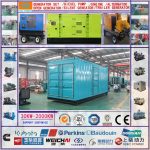Introduction
Diesel generators are essential power sources that provide backup electricity during power outages or serve as the primary power source in remote locations where grid power is unavailable. One critical aspect of diesel generators is their ability to respond quickly and effectively to sudden changes in electrical load, known as transient response. In this article, we will explore the importance of transient response in diesel generators, how it is achieved, and the factors that influence it.
Importance of Transient Response in Diesel Generators

Transient response in diesel generators refers to their ability to adjust quickly to sudden changes in electrical load without compromising the stability and reliability of the power supply. This capability is crucial in various applications, including emergency backup power systems, industrial processes, and grid stabilization.
During 75kw diesel generator , diesel generators are designed to provide a steady and constant power output to meet the connected load requirements. However, in real-world scenarios, sudden changes in load demand can occur due to events such as starting large motors, switching on heavy equipment, or other transient disturbances. Without a robust transient response capability, diesel generators may struggle to adjust to these rapid load changes, leading to voltage fluctuations, frequency deviations, and potential damage to connected equipment.
Achieving Efficient Transient Response in Diesel Generators
Several factors contribute to the efficient transient response of diesel generators. These include the design and configuration of the generator set, the characteristics of the engine and alternator, the control system, and the overall system architecture. Let's explore these factors in more detail:
1. Generator Set Design and Configuration: The design and configuration of the generator set play a crucial role in determining its transient response capabilities. Factors such as the size of the generator, the type of engine used, the alternator specifications, and the cooling system all influence how quickly the generator can respond to changes in load.
2. Engine and Alternator Characteristics: The engine and alternator are the core components of a diesel generator that directly affect its transient response. The engine's power output and torque characteristics, as well as the alternator's efficiency and voltage regulation capabilities, are essential considerations in achieving fast and stable transient response.
3. Control System: The control system of a diesel generator plays a critical role in monitoring and adjusting the power output in response to load changes. Advanced control systems equipped with digital controllers, sensors, and feedback mechanisms can optimize the generator's performance during transient events and ensure smooth and reliable operation.
4. System Architecture: The overall system architecture of a diesel generator installation, including the electrical connections, protection devices, and synchronization mechanisms, also influences its transient response characteristics. A well-designed system architecture minimizes voltage fluctuations, frequency deviations, and other disturbances during load changes.
Factors Influencing Transient Response in Diesel Generators
Several factors can influence the transient response of diesel generators, affecting their ability to maintain stable power output during sudden load changes. Some of the key factors include:
1. Engine Speed Regulation: The speed regulation of the diesel engine is a crucial factor in determining how quickly the generator can respond to load changes. Engines with better speed regulation capabilities can adjust their power output more efficiently, resulting in improved transient response.
2. Governor Response Time: The governor system controls the fuel supply to the engine and plays a significant role in regulating the engine speed during load variations. A fast and responsive governor system can help the generator maintain stable frequency and voltage levels during transient events.
3. Alternator Design: The design and specifications of the alternator, including its voltage regulation capabilities and efficiency, impact the generator's transient response. High-quality alternators with robust voltage control mechanisms can help stabilize the power output during sudden load changes.
4. Load Characteristics: The type of load connected to the diesel generator can also affect its transient response. Different loads, such as resistive, inductive, or capacitive loads, have varying power factor characteristics that can influence the generator's ability to adapt to rapid load fluctuations.
5. System Inertia: The inertia of the generator set, including the engine, alternator, and connected equipment, plays a crucial role in determining how quickly the system can respond to changes in load. Higher system inertia provides more stability and helps dampen transient disturbances.
Conclusion
In conclusion, transient response is a critical aspect of diesel generators that ensures their reliable operation during sudden changes in electrical load. By understanding the factors that contribute to efficient transient response, such as generator set design, engine and alternator characteristics, control systems, and system architecture, operators can optimize the performance of their diesel generators and minimize the risk of power disruptions. As diesel generators continue to play a vital role in backup power systems and industrial applications, enhancing their transient response capabilities will be essential in meeting the growing demand for reliable and stable power supply.
